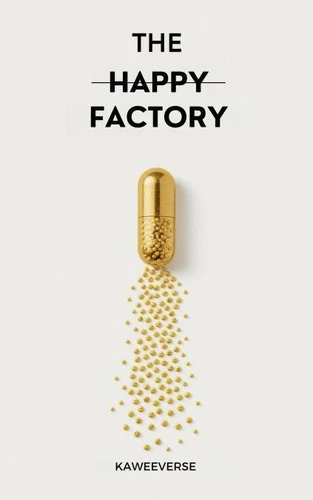The Happy Factory
Par :Formats :
Disponible dans votre compte client Decitre ou Furet du Nord dès validation de votre commande. Le format ePub est :
- Compatible avec une lecture sur My Vivlio (smartphone, tablette, ordinateur)
- Compatible avec une lecture sur liseuses Vivlio
- Pour les liseuses autres que Vivlio, vous devez utiliser le logiciel Adobe Digital Edition. Non compatible avec la lecture sur les liseuses Kindle, Remarkable et Sony
 , qui est-ce ?
, qui est-ce ?Notre partenaire de plateforme de lecture numérique où vous retrouverez l'ensemble de vos ebooks gratuitement
Pour en savoir plus sur nos ebooks, consultez notre aide en ligne ici
- FormatePub
- ISBN8231020263
- EAN9798231020263
- Date de parution10/06/2025
- Protection num.pas de protection
- Infos supplémentairesepub
- ÉditeurWalzone Press
Résumé
Modern corporate culture claims to champion "employee happiness, " "one big family, " and "growth opportunities, " but in reality serves as a sophisticated tool for conditioning people to sacrifice their humanity at the altar of productivity. Drawing from the philosophies of Hustle Culture, Corporate Washing, and Performative Positivity that society has normalized as "acceptable."Tara-an ambitious young employee at Happy Corp-is seduced into believing that 18-hour workdays are not just normal, but admirable.
The gleaming office boasts the slogan "Work Hard, Play Harder!" complete with sleeping pods, a sauna, and free drinks bar for "relaxation." Yet everything is meticulously designed to keep employees within the building's walls as long as possible. Executives preach about the "Happy Corp family" and their "mission to bring happiness to society" with saccharine sincerity. Colleagues compete to post smiling office selfies with motivational captions on social media.
Tara begins to feel something is off, but she's gradually conditioned to accept that "this is the success everyone wants."This novel doesn't merely critique-it invites readers to examine how the "normal" that society accepts might be a system's tool for consuming our humanity. It asks: "What are you willing to trade for the shallow 'success' and 'happiness' that the system defines for you?" And it reminds us that constantly questioning what appears "normal" may be our last defense against losing ourselves entirely.
The gleaming office boasts the slogan "Work Hard, Play Harder!" complete with sleeping pods, a sauna, and free drinks bar for "relaxation." Yet everything is meticulously designed to keep employees within the building's walls as long as possible. Executives preach about the "Happy Corp family" and their "mission to bring happiness to society" with saccharine sincerity. Colleagues compete to post smiling office selfies with motivational captions on social media.
Tara begins to feel something is off, but she's gradually conditioned to accept that "this is the success everyone wants."This novel doesn't merely critique-it invites readers to examine how the "normal" that society accepts might be a system's tool for consuming our humanity. It asks: "What are you willing to trade for the shallow 'success' and 'happiness' that the system defines for you?" And it reminds us that constantly questioning what appears "normal" may be our last defense against losing ourselves entirely.
Modern corporate culture claims to champion "employee happiness, " "one big family, " and "growth opportunities, " but in reality serves as a sophisticated tool for conditioning people to sacrifice their humanity at the altar of productivity. Drawing from the philosophies of Hustle Culture, Corporate Washing, and Performative Positivity that society has normalized as "acceptable."Tara-an ambitious young employee at Happy Corp-is seduced into believing that 18-hour workdays are not just normal, but admirable.
The gleaming office boasts the slogan "Work Hard, Play Harder!" complete with sleeping pods, a sauna, and free drinks bar for "relaxation." Yet everything is meticulously designed to keep employees within the building's walls as long as possible. Executives preach about the "Happy Corp family" and their "mission to bring happiness to society" with saccharine sincerity. Colleagues compete to post smiling office selfies with motivational captions on social media.
Tara begins to feel something is off, but she's gradually conditioned to accept that "this is the success everyone wants."This novel doesn't merely critique-it invites readers to examine how the "normal" that society accepts might be a system's tool for consuming our humanity. It asks: "What are you willing to trade for the shallow 'success' and 'happiness' that the system defines for you?" And it reminds us that constantly questioning what appears "normal" may be our last defense against losing ourselves entirely.
The gleaming office boasts the slogan "Work Hard, Play Harder!" complete with sleeping pods, a sauna, and free drinks bar for "relaxation." Yet everything is meticulously designed to keep employees within the building's walls as long as possible. Executives preach about the "Happy Corp family" and their "mission to bring happiness to society" with saccharine sincerity. Colleagues compete to post smiling office selfies with motivational captions on social media.
Tara begins to feel something is off, but she's gradually conditioned to accept that "this is the success everyone wants."This novel doesn't merely critique-it invites readers to examine how the "normal" that society accepts might be a system's tool for consuming our humanity. It asks: "What are you willing to trade for the shallow 'success' and 'happiness' that the system defines for you?" And it reminds us that constantly questioning what appears "normal" may be our last defense against losing ourselves entirely.



